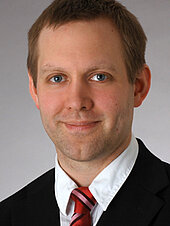Gralke, Jens
Dissertation topic: "Tradition and Institution. Friedrich August von Hayek's theory of cultural evolution."
Congratulations on passing the viva voce on 1 February 2020.
Contact address at the University of Würzburg:
Chair of Christian Social Science
Paradeplatz 4
97070 Würzburg
Tel. 0931/31-82278
First supervisor: Prof Dr Dr Gerhard Droesser
Second supervisors:
Prof Dr Stephan Wirz (Univ. Lucerne)
Class in the Graduate School: "Philosophy, Languages, Arts"
Doctorate in the Graduate School from SS 2014.
Abstract:
The thesis is dedicated to the question of what characteristics social orders must have in order to maximise their temporary existence. Building on the work of Friedrich August von Hayek, social conditions of the present are to be understood as the result of an adaptation process that a particular society has carried out in the past with regard to a changing environment. Since the institutions of a society and its actions are decisive for its stability, the conditions under which this stability develops will be analysed with reference to von Hayek. Von Hayek distinguishes between spontaneously created institutions and planned state institutions.
In my opinion, it is von Hayek's conviction that state institutions can only be maintained in the long term if they reflect people's habits of thought and behaviour. Ultimately, they must imitate the characteristics of spontaneously created institutions. Von Hayek thus formulates a stability criterion for structures whose preservation is essential for the existence of a society. Von Hayek's theory of society is based on the assumption that the characteristics of every order can be reconstructed by analysing the characteristics of its constituent elements. With regard to a society, this means that the stability conditions of a society can only be derived by analysing the characteristics of the people.
Von Hayek now discusses the characteristics of the human species within a neuronal theory that implies two essential results: Firstly, there is no mental causation in the realm of the physical and secondly, the nervous system is to be understood as a plastic predictive apparatus. The first thesis is based on the assumption that liberalism, in Hayek's version, denies the existence of free will. I will try to show that von Hayek consistently pursues this idea in his description of the social order. The second result is the microstructural prerequisite for the assumption that von Hayek developed a theory in his theory of society that specifies clear criteria for the failure or stability of societies. The work is dedicated to the task of firstly presenting this idea lucidly and secondly discussing it in the context of recent research on this topic.
Keywords: von Hayek, prediction machine, cultural evolution, institutions, justice, imitation learning, stability, tradition






